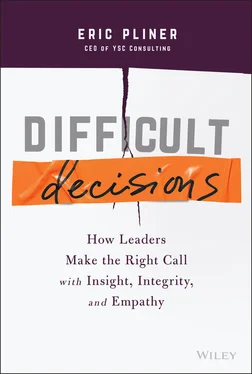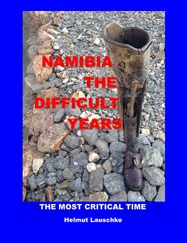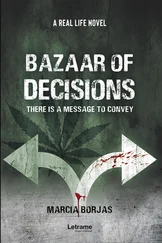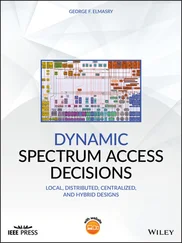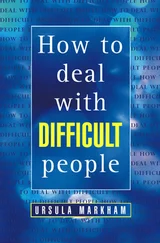A hiring manager may know that his role demands protecting the financial, social, and structural interests of his institution by ensuring the placement of the best possible candidate in each position in his part of the organization. His personal morals might suggest that all individuals in a work setting should be judged based solely on the quality of their work, and not on their social identities – ability status, country of origin, gender identity, race, religion, sex, or sexual orientation, among others. And his ethical context might suggest that a meritocratic system is the fairest, aligning his morals and ethics in service of his role. However, as collective ethics shift to embrace a broader understanding that ostensibly meritocratic employment systems do not account for educational or structural disparities or the intangible value of lived experience among those holding marginalized identities, he might find that his role and ethical context align to supersede his personal morals. Such alignment enables clarity of decision-making, and may also, in some cases, lead to a reevaluation of said morality.
Board chairs know that they are responsible for representing the interests of shareholders, bar none. Although these interests are not exclusively financial, the board's role in governance is generally clear. In the case of a CEO accused of one or more extramarital relationships, the board chair's personal morality may identify adultery as wrong; conversely, it may indicate that extramarital relationships are private matters only. Neither of these views is relevant, however, until the ethical (and legal) context is considered: where personal relationships in the workplace were long ignored, contextual ethics would suggest that the presence of a power imbalance, an exchange of money, or access to decision-making makes the matter one of concern for the board. If role (“protect the interests of shareholders, so it's our business”) and personal morality (“relationships are private matters, so this is none of our business”) come into conflict, alignment with the ethical context will ensure the best possible decision about the prospect of his removal (“Do the CEO's actions involve power, money, or access?”).
Where there are gaps or differences among these three constructs is where the leader must make choices, and these choices will have consequences. Making everyone happy is impossible; the likelihood of the leader shaping a net-positive outcome is far greater than the likelihood of experiencing unmanageable blowback when the leader explores the moral, ethical, and role triangle in advance and as a matter of course.
Once that work has begun – and it is never finished, as it has to be refreshed regularly – leaders can make more intentional and explicit decisions that align with their values and enable them to operate with integrity.
Accordingly, the CEO grappling with the morality of laying off employees during an economic downturn might first clarify her desire to be experienced as both savvy and compassionate, her belief that business exists to generate wealth for individuals and communities, her view that the purpose of her specific business is to improve individuals' quality of life, and her understanding that fulfilling these purposes and beliefs requires the business to sustain itself profitably for the long run. She can then reconcile her view of the potential immorality of taking away livelihood during a period of economic challenge by noting the alignment of contextual ethics (that is, it is appropriate, ethical, and imperative to do what is necessary to sustain the company for the long-run) and her role (in other words, the needs of her total stakeholders – including the vast majority of employees – likely override the needs of any one individual).
The CEO who has communicated the desire to be both compassionate and savvy will recognize that some previous situations may have asserted one characteristic over the other. Before making the decision to reduce headcount, she can consider, “Where have previous decisions reflected my morals, ethical context, and role responsibilities congruently?” and “What's similar or different this time?” The outcome of this reflection might lead the CEO to a different decision – but it might instead lead to a reckoning between her underlying values and her communicated messaging.
Exploring how she has communicated what matters to her as a person, as a leader, and as a steward of the company – and how her previous actions have reinforced or undermined these messages – will help the CEO to understand the alignment and/or gap between her intent and her impact. She will then be able to look at seemingly conflictual decisions like layoffs with clarity: what do I want to stand for, what will my action suggest I genuinely stand for, and am I okay with a discrepancy there? Will my stakeholders be okay with that discrepancy? And if not, do I need to adjust my decision(s) or my ostensible values?
Making complex decisions under the pressure of time is a requirement of most leaders, but these decisions do not exist in a vacuum. The more each leader invests in exploring the integrity of her decision-making framework in the abstract, the better she can make tough calls quickly in the future. And each of these decisions will enable the leader to further sharpen her understanding of her underlying values, the role that she is fulfilling, the ethical context in which she is operating, and alignment or disparity among these – just in time for the next set of difficult choices.
In situations as deeply personal, truly complex, and with real human consequences as taking away an individual's employment (or others described above), nuance does not work to the leader's advantage. She must consider: what do I stand for most critically and clearly? And if that stand is clear, will others understand my decision without extensive, detailed explanation?
Difficult Decision: Containing Contagion
As the coronavirus outbreak continues, many multinational employers are rethinking how employees even outside of mainland China work together, one chief executive says. Eric Pliner, CEO of YSC Consulting … tells WSJ that workers … throughout Asia find themselves cancelling air travel due to concerns about the virus. “Everyone is thinking about coronavirus right now,” Pliner says … As a result, Pliner says many employers are now asking the same question: “How do we work globally if we have to reduce dependence on air travel?”
– Chip Cutter, Wall Street Journal , 2020 7
Six weeks after I gave this utterly scintillating interview, my own leadership team was still thinking about coronavirus but no longer limiting our debate to questions of travel. In truth, it wasn't a terribly difficult decision to close our largest offices the first time around. We'd considered our options from many angles, but the actual choice was reasonably straightforward. With a former employee comatose in one of the world's most highly publicized and prominent cases of what would eventually be known as long COVID, we understood all too well the stakes for individual well-being. The offices that had been affected by the novel coronavirus prior to March of 2020 were among our smallest, but they had taken swift action, arranged equipment and infrastructure to enable secure remote working, and successfully ensured reasonable comfort and support for employees working from home. Making the call to close hubs in London and New York, therefore, was made easier by test cases in less-populated markets but also by some degree of naïveté: We thought we'd be shutting down for a few weeks at most.
Because our moral obligation to care for the well-being of our people and their families aligned neatly with our ethical obligation to avoid putting people in harm's way and with only limited or short-term compromise to our responsibilities as leaders of a business, there was no notable conflict among the sides of the triangle. We were able to make an uncomfortable choice – to close the offices and ask everyone to work remotely for the short-term – without much real sacrifice.
Читать дальше
